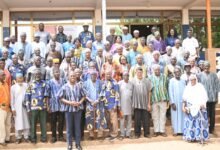
The Court of Arbitration for Sport (CAS) yesterday flung out Wilfred Osei Kwaku Palmer’s case against the Ghana Football Association (GFA).
Mr Osei Kwaku, owner of former Premier League side Tema Youth, dashed to the Switzerland-based sports court to contest his disqualification from the GFA presidential polls in October 2019.
Kurt Okraku emerged winner of the fiercely contested elections.
The appellant was seeking CAS to efface the FA elections and his candidature restored for unsullied elections to be held, contending that he was “unfairly” disqualified in the first place.
After two intriguing deferred judgments (July 17 and August 4, 2020) on the case, however, CAS delivered a ruling that may have stunned followers of the Tema Youth capo.
In a letter signed by the President of the Panel, Michele Bernasconi, and addressed to the two ‘feuding’ parties in the wee hours of yesterday, CAS shored up the FA’s decision to debar Palmer.
The former FA Executive Committee member was barred by the now-defunct Normalisation Committee/Elections Committee from contesting the elections over his failure to pay a 10 per cent mandatory fee to the GFA, following the transfer of two of his players – Joseph Paintsil (€300,000) and Gabriel Laveh ($15,000).
He was also deemed by the Lawyer Frank Davis Vetting Committee to have ‘sinned’ after comments he made on radio linking Ghana’s Black Stars failure to qualify for the 2018 FIFA World Cup to the inability of the country to make “unclassified payments” to match officials.
The Vetting Committee had held that Palmer’s action was in brazen breach of the GFA Regulations [Article 33 (5) (C)] and that a person seeking to govern an institution cannot be seen to be disregarding that very institution’s rules and regulations.
The business mogul was consequently found guilty by a judicial body of the GFA (Ethics Committee) for the comments and say the remarks prove “Palmer lacks moral integrity to hold the position of GFA President.”
Palmer has told the media that his decision to seek redress at CAS had cost him over $50,000.
BY JOHN VIGAH







